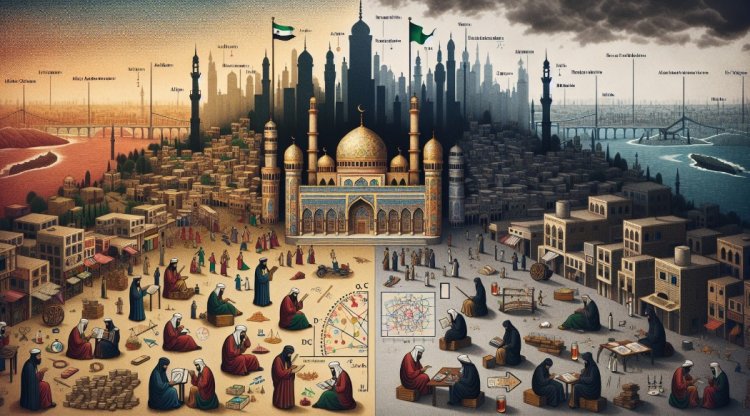The Economic Failure of the Islamic World: Explained
Examining the complex economic landscape of the Muslim world, highlighting diverse challenges and opportunities, while avoiding simplistic generalizations. Discover key factors, historical context, and initiatives driving progress.

Introduction
Upon analyzing the economic situation of countries with a Muslim-majority population, it becomes evident that several recurring factors come to the forefront. These countries are often characterized by high levels of poverty and a significant adherence to the Islamic faith. The underlying causes of this phenomenon have been the subject of extensive research by historians, leading to the development of numerous theories. Nevertheless, two theories have garnered considerable attention and support within society.
One theory posits that the Islamic religion and culture are inherently resistant to progress. According to this perspective, it is argued that Muslims tend to reject certain ideas such as commerce and democracy, which in turn may contribute to a state of stagnation and underdevelopment. On the contrary, it is worth noting that a relatively small proportion of Muslims reside in democratic societies, whereas the majority of the global population tends to adopt and support this particular model of political organization.
According to the second theory, the historical effects of colonialism by Western powers are to blame for the economic difficulties faced by Muslim nations. The argument posits that colonial powers have taken advantage of these nations, hindering their progress and perpetuating poverty. Although colonialism has indeed had negative consequences, it is important to note that the economic decline of the Islamic world predates the influence of colonialism.
It is worth mentioning that during the Middle Ages, the Islamic world held the distinction of being the most affluent region on a global scale. Muslim societies have historically been recognized for their significant contributions in the fields of commerce, finance, and scientific discoveries. The Islamic world has made significant contributions to human knowledge and progress through the creation of notable inventions, including algebra and modern medicine. Hence, it can be inferred that factors beyond religion or colonialism likely played a role in shaping the present economic circumstances.
Exploring the reasons
The economic failure of the Islamic world can be attributed to various significant factors. Examining these factors can provide insight into the present economic state of nations with Muslim-majority populations.
The economic prosperity of the Muslim Middle East in the Middle Ages
In the historical period known as the Middle Ages, the Islamic world emerged as the most prosperous region on a global scale. Muslim societies have historically been recognized for their notable contributions in the fields of commerce, finance, and scientific discoveries. The Islamic world has made significant contributions to human knowledge and progress through the development of various inventions, including algebra and modern medicine. This suggests that there must be additional factors, beyond religion or colonialism, that have played a role in shaping the present economic circumstances.
The decline in wealth before the era of colonialism
By the year 1700, the Islamic world had undergone a notable decrease in economic prosperity, with its share of the global gross domestic product (GDP) declining from 10% to a mere 2.2%. The decline in question occurred before the advent of colonialism, indicating that there were likely other contributing factors involved.
The impact of inheritance laws and the chronic dwarfism of companies
In countries where Islam is practiced, inheritance laws are governed by the principles outlined in the Quran, resulting in a system that promotes equality among heirs. Although this concept may appear sophisticated in the present era, it has historically posed obstacles to the expansion of businesses. Due to the dispersion of inheritances among numerous heirs, sons faced considerable challenges in acquiring the essential capital required to restore their fathers' businesses. As a consequence, there was a prevalence of chronic dwarfism among companies, leading to a dearth of motivation to establish larger enterprises.
The prohibition on interest-bearing loans and its effect on banking
The prohibition of interest-bearing loans according to Islamic principles posed a challenge to the development of the banking sector. Although there were certain exceptions and loopholes, the prohibition endured for a significant period before its eventual repeal. As a consequence, there was a significant setback of over two centuries in the progress of establishing prominent financial institutions in the Middle East. This setback had a direct impact on the availability of financial resources for businesses in the region.
The limitations of forming collaborations between Islamic and Western companies
Establishing partnerships with Western companies poses challenges in Muslim countries due to the necessity of adhering to Islamic law. The limitations imposed had the effect of reducing the possibilities for forming partnerships across different cultures, thereby impeding the progress of economic growth. Religious communities that did not fall under the jurisdiction of Islamic law frequently experienced greater prosperity within these regions.
The lack of development and innovation in business structures
For over a millennium, the business structures in the Islamic world have experienced minimal alterations. While Europe was pioneering innovative business structures, Muslim countries experienced a relative delay in their development. The absence of progress and creativity played a role in the economic stagnation experienced in the region.
Various factors contribute to the understanding of the economic failure of the Islamic world. These factors include the Middle Ages' economic prosperity for the Muslim Middle East, the subsequent decline in wealth before the era of colonialism, the impact of inheritance laws and the ongoing underdevelopment of companies, the ban on interest-bearing loans, the difficulties in forming partnerships between Islamic and Western companies, and the limited advancement and innovation in business structures.
Religious Influence on Economic Growth
The influence of religion on the economic development of nations with a Muslim majority has been substantial. Several factors emphasize the significance of religious influence on the economic conditions in these countries.
The shift towards bureaucratic and military jobs
Within the Islamic world, a notable transformation occurred in the range of employment opportunities that became accessible. The prevalence of bureaucratic and military roles increased, whereas commerce and industry assumed a less prominent role. The reallocation of labor hurt economic advancement, as there was a reduced emphasis on entrepreneurial endeavors.
The rise in power of religious elites
During this period, a group of religious elites, commonly referred to as the 'Ulema,' experienced a significant rise in their power and influence. They were individuals who possessed extensive knowledge and expertise in Islamic law and theology, making them the religious authorities in their respective fields. As their power grew, they were able to establish alliances with prominent political figures, including sultans and caliphs. The union of political and religious authorities had a limiting effect on the progress and advancement of the economy.
The marriage between political and religious authorities
In Muslim countries, seeking legitimacy was the main driving force behind the alliance between political and religious authorities. Due to a series of unfortunate events, including crop failures, epidemics, and wars, the local population was compelled to seek solace in rural areas. Consequently, this mass exodus from urban centers resulted in a significant downturn in trade and commercial activities within these cities.
The religious authorities played a crucial role in granting legitimacy to political leaders, thereby strengthening their power and influence over the economic resources of the region.
Crop failure and its impact on the alliance between rulers and religious leaders
The occurrence of crop failures served to further solidify the alliance between rulers and religious leaders. As individuals migrated to rural regions to ensure their access to food, political leaders found it necessary to garner the backing of religious leaders to uphold their authority and influence over the populace.
The formation of this alliance, although beneficial to the political and religious elite, had a detrimental effect on economic progress as it impeded the development of entrepreneurship and innovation.
The prohibition of the printing press as a threat to religious authority
The printing press, considered one of the most groundbreaking inventions of its time, faced an initial ban in the Ottoman Empire that lasted for more than two centuries. The religious authorities perceived the printing press as a potential challenge to their authority and ability to regulate the dissemination of knowledge.
The printing press challenged the exclusive authority that religious scholars held by facilitating the spread of ideas and information. The limitations placed on the spread of knowledge impeded both intellectual and economic advancement within the area.
It can be observed that the presence of religious influence has exerted a notable effect on the economic development of nations with a Muslim majority. The transition towards bureaucratic and military occupations, the increasing influence of religious elites, the merging of political and religious powers, crop failures, and the restriction on the printing press were all factors that played a role in the economic stagnation and lack of progress experienced in these nations.
To effectively tackle the economic challenges that the Islamic world is currently facing, it is imperative to have a comprehensive understanding of the historical factors that have contributed to these circumstances.
The Influence of History and Institutions
The economic development of contemporary nations with a Muslim majority is significantly shaped by their historical institutions. These institutions have played a significant role in shaping the economic landscape, and their influence continues to have a lasting impact on its ongoing development.
The influence of past institutions on present-day economic development
The historical institutions that have existed in the Islamic world have exerted a significant influence on the current state of economic development. In the past, the Islamic world held the distinction of being the most affluent region on a global scale. It was renowned for its notable progress in the fields of commerce, finance, and scientific breakthroughs. Nevertheless, these institutions have undergone transformations throughout history.
The impact of cultural incentives and norms
Cultural incentives and norms exert a substantial influence on the trajectory of economic development. Companies in Muslim-majority nations often face challenges related to their growth and expansion, which can be attributed to the influence of inheritance laws outlined in the Quran. These laws, which govern the distribution of assets and wealth among family members, can sometimes result in a phenomenon referred to as "chronic dwarfism" within these companies. The presence of these cultural norms, among other factors, impeded the progress of large businesses and hindered innovation.
The embrace of secularism in Eastern countries
In certain Eastern countries, the concept of secularism has been embraced distinctly compared to the Western approach. This is frequently observed through movements such as Arab socialism. The various changes in culture have produced a range of outcomes and have influenced economic progress in diverse ways.
The role of institutions in hindering economic growth
Muslim-majority countries have experienced hindrances to their economic growth due to the influence of various institutions, including those of a religious and political nature. The union of religious and political authorities resulted in a consolidation of power and hindered economic advancement. Furthermore, the imposition of restrictions on loans that accrue interest, as well as the constraints on establishing partnerships with companies from the Western world, have impeded the progress of economic development.
The potential for an economic and democratic boom in the future
Despite having faced various challenges in the past, it is important to acknowledge the potential for significant economic and democratic progress in the future of countries with Muslim-majority populations. As societies progress and implement economic reforms, these nations are presented with the chance to surpass longstanding obstacles and achieve substantial growth and advancement.
FAQ
Below are several commonly asked questions regarding the economic challenges faced by the Islamic world:
Did the Middle East experience a decline or simply a period of stagnation?
The economic development of the Middle East witnessed a combination of decline and stagnation. During the Middle Ages, the region held the distinction of being the most affluent globally. However, it subsequently underwent a substantial decrease in wealth before the advent of colonialism. The decline in question occurred before the advent of colonialism, indicating that there were likely other contributing factors involved.
What other potential factors contribute to the existence of economic inequality?
Apart from considering religious and colonial influences, it is worth exploring various additional factors that could contribute to the economic disparity observed in countries with a Muslim-majority population. Some of the factors that contribute to these issues are the influence of inheritance laws and the persistent underdevelopment of companies, the prohibition on interest-based loans, restrictions on collaborations between Islamic and Western companies, and the limited progress and innovation in business structures.
What is the outlook for economic and democratic development in countries where Muslims make up the majority of the population?
Although Muslim-majority countries have encountered various challenges, it is important to recognize the potential for future economic and democratic growth within these nations. As societies progress and adopt economic reforms, these nations can seize the chance to surpass longstanding obstacles and achieve substantial growth and development.
Are there additional factors, apart from oil and tax havens, that contribute to future development?
Indeed, it is true that there exist additional factors, apart from oil and tax havens, that can play a significant role in fostering future development within countries where the majority of the population adheres to the Islamic faith. Some of the key factors that contribute to economic growth and development are the promotion of industry diversification, investment in education and human capital, encouragement of innovation and technological progress, enhancement of infrastructure and connectivity, and the establishment of a conducive business environment.



 admin
admin 










